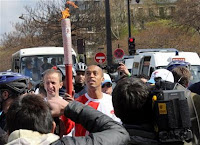Hillary Clinton has joined House Speaker Nancy Pelosi in calling on George Bush
to boycott the opening ceremonies of this summer's Olympic Games in Beijing. Clinton today called Bush "wrong to downplay human rights" in the face of China's suppression of protests in Tibet and surrounding regions, and its support of the government in Sudan despite the documented genocide in Sudan's Darfur region. "President Bush should not plan on attending the opening ceremonies in Beijing, absent major changes by the Chinese government,'' Clinton said in a statement. Bush plans to attend the Games this August, including the Aug. 4 opening ceremony in the city where his father was once ambassador. Bush is certain not to change his mind ... I believe he wants China to consider him a "lao pengyou" -- an old friend -- as it does his father. And Britain's Gordon Brown is sure to be there -- London hosts the next Summer Olympics in 2012. But the handful of Western leaders staying away from Beijing's opening ceremonies could trigger more no-shows, and if such a movement gathers more momentum it would percolate to the top of media coverage. Not at all something China wants to see.

Since blogs are meant to be extensions of one's personal existence -- and since I haven't been near any Tibet or Olympic protests in the past week -- I'll try citing instead a couple of stories written by friends and former colleagues about the issue. One is
from Paris, where the Olympic torch relay "descended into chaos Monday, with protesters scaling the Eiffel Tower, grabbing for the flame and forcing security officials to repeatedly snuff out the torch and transport it by bus past demonstrators yelling "Free Tibet!" This article, co-written for The Associated Press by Elaine Ganley, describes the nightmarish and at times comically surreal scene of Chinese security agents in warmup suits and French police "flics" on roller blades failing miserably to stop interference from demonstrators protesting China's stance on Tibet and Sudan. "The relentless anti-Chinese demonstrations ignited across the capital with unexpected power and ingenuity, foiling 3,000 police officers deployed on motorcycles, in jogging gear and even inline skates. Thousands of protesters slowed the relay to a stop-start crawl, with impassioned displays of anger over China's human rights record, its grip on Tibet and support for Sudan despite years of bloodshed in Darfur. Five times, the Chinese officials in dark glasses and tracksuits who guard the torch extinguished it and retreated to the safety of a bus - the last time emerging only after the vehicle drove within 15 feet of the final stop, a track and field stadium. A torchbearer then ran the final steps inside." The Olympic flame has been dogged by protesters since it was handed over to Chinese officials in Greece on March 30. It's hard to imagine a more humiliating and embarrassing appearance for the usually welcomed symbol of the Games than today's trajectory in the French capital. And what was Chinese security doing surrounding the torch anyway? Sounds like creating a target. I feel sorry for the athletes carrying the torch, no doubt caught up in the infectious spirit -- and it is always infectious -- of the runup to an Olympics. A
washingtonpost.com story today noted that when the flame crossed the Seine River opposite the Eiffel Tower, "pro-Tibet demonstrators pelted the torch bearer -- a wheelchair-bound ping pong player -- and his assistants with bottles of juice, fruit and other projectiles."
Meanwhile today in San Francisco, the tortured torch's next stop where it arrives on Wednesday, three protesters climbed up the Golden Gate Bridge and anchored a Tibetan flag and two banners reading "One World One Dream. Free Tibet" and "Free Tibet." (
"Tong yige shijie, tong yige mengxiang" is the Beijing Games' slogan: "One World, One Dream.")
John Glionna, the San Francisco bureau chief of the Los Angeles Times,
wrote last Wednesday that the torch is scheduled to arrive for its only North American appearance in SF this week, "but this politically charged city is still squabbling over whether to roll out or roll up the red carpet." He noted accusations that SF Mayor Gavin Newsom is trying to keep the flame's route a secret and that police are under orders to arrest anyone from displaying signs or banners supporting Tibet, Darfur or the Falun Gong religious sect that is banned in China. Last week SF's Board of Supervisors "took a stand that seemed anything but welcoming, voting 8 to 3 for a resolution to greet the torch 'with alarm and protest'."
What's surprising is that Chinese authorities seem to be caught by surprise. Surely they anticipated protests over China's human rights and foreign policy as the Olympics draw near. And the fact that demonstrators in the West can get much closer to the objects of their protests than in China couldn't have been lost on torch relay organizers. (There
were all those Chinese security joggers after all). The torch moves on next to Buenos Aires and Dar-es-Salaam, but later hits New Delhi and Hong Kong, where it's likely to face further, and perhaps even more vociferous, protests. Clouds may be gathering for China's coming-out party in four months and a day.







